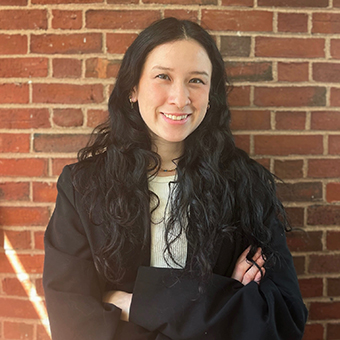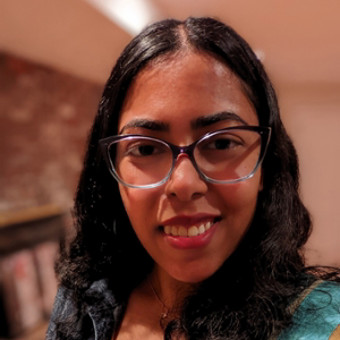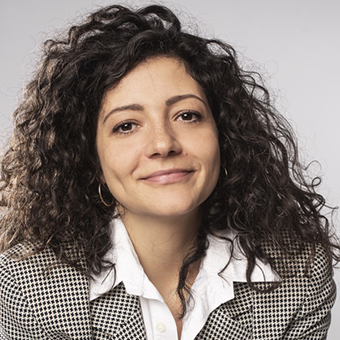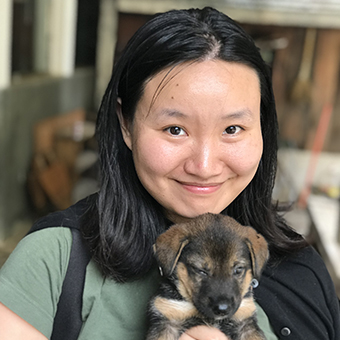GSAS Students Earn Prestigious External Grants for 2024 and Beyond
May 14, 2024
Abigail Arnold | Graduate School of Arts and Sciences
In recent months, students in Brandeis University’s Graduate School of Arts and Sciences have earned a variety of prestigious external grants and fellowships for the upcoming academic year. Traveling to locations from California to Germany, they will pursue their research on a range of topics, from sterilization experiments conducted during the Holocaust to multicultural families’ experiences in contemporary South Korea. GSAS talked to four of these students, from the Sociology, Physics, History, and Anthropology PhD programs, about their research, what they’re looking forward to in the upcoming year, and what advice they have for other students pursuing grant applications.

What grant did you receive?
I received a Fulbright U.S. Student Award to conduct research in South Korea. The grant is for ten months, although I hope to be able to stay for at least a year, conducting fieldwork, interviews, and quantitative analysis. I leave for South Korea towards the end of August.
What does your research focus on?
My dissertation project focuses on multicultural families in South Korea. I am looking at families in which the parents consist of a Korean citizen and a foreign spouse and asking how foreign spouses and mixed children are treated differently–what kinds of race, ethnicity, class, and gender discrimination they experience. After the Korean War, South Korea underwent a rapid economic transformation from being an agricultural society, but it also underwent the most rapid fertility decline ever. Since 2013, the country has had the lowest birthrate in the world, and this year they beat their own record, so this is very much a hot topic. Intermarriage and immigration has been the only solution since the early 2000s, when the government relaxed immigration policies, allowed many women from China and Southeast Asia to come to the country to marry, and actively promoted multiculturalism. I’m asking how immigrants and multiculturalism are viewed; the country is still ethnically 92% Korean, so how do immigrants navigate this?
How did you go about applying for the grant? Were there any resources on campus that helped you in the process?
I connected with the Academic Fellowships office via email early in the summer; they were sending out emails and shared a timeline to break down and manage the application process. I was able to start thinking about the process in earnest once I got back from doing preliminary research in South Korea in late August. The process was daunting because it was a big prestigious grant, but the Academic Fellowships team was such a huge help. I never used to write lots of drafts of applications, so it was helpful to have the structure they provided and to talk to people who had experience helping with applications and get a sense of what the different aspects (short answer questions and personal and research statements) should be. I also talked with a Brandeis professor who got a Korean Fulbright when they were a graduate student, and I used resources from Brandeis to contact others who’d received Korean Fulbrights to see what the organization wanted. People generously sent me their draft statements, which helped me shape and frame my application.
What are you most excited about in the upcoming research process?
I’m excited for the experience of living in South Korea for a whole year. Prior to last summer, I had only visited with my mom, who is Korean. I’m excited to immerse myself in the culture and community. I’m also looking forward to being able to work on my own project that I’m really excited and passionate about–being in the field, doing interviews, and learning more outside of reading others’ work. Specifically for Korea, part of the Fulbright application process is getting a letter of affiliation, and I connected with a professor at Korea University who does similar research–I’m excited to build my academic network with other sociologists.
What advice would you give to other students applying for grants?
Definitely utilize the services of Academic Fellowships! They’re really thorough about how to break down the process, so they’re great to work with if you have trouble starting a bigger process. They also prepare you well for an interview process – while my application didn’t end up including one, it still helped me feel stronger about my application. Of all the grant applications I’ve done, I felt most confident in this one.
Start as early as you can, and remember both the campus deadline and the Fulbright deadline! For the actual application for a Fulbright, it’s important to have a connection to the country you’re applying to – for me, it was family, but it can be something else. It has to be a reason you’re passionate about it. Emphasize why the project has to be carried out there and why you’re the best person to carry it out. In addition, keep the organizational values of the grant in mind, and try to showcase them in your application. For the Fulbright, there are a lot of resources created by past and current applicants – check if the grants you are applying to have anything similar, since knowing what to look forward to and having community helps. Finally, once you submit your application, pretend you never applied, or the wait will feel so, so long!

What grant did you receive?
I received a Kavli Institute for Theoretical Physics (KITP) Graduate Fellowship. The Kavli Institute is a research institute at UC Santa Barbara, and I will be there from July to December. The fellowship is aimed at giving graduate students a broader exposure to theoretical physics, since graduate students often specialize narrowly and lose the bigger picture.
What does your research focus on?
I research active matter – the kind of things that make up living systems. Life has been explored in a lot of fields, but for a long time we didn’t have the proper tools in physics to do so – now we’re moving towards that, and it’s becoming a more popular subfield. An experimental system using subcellular polymers was discovered at Brandeis to study active systems in the lab. I study theoretical models of a network of springs that mimic this polymer network. The beauty of such a theoretical model is that it is fairly simple, devoid of all the details of a cellular environment, and yet it allows us to understand in simple terms what controls certain mechanical properties of the cell.
At KITP, I will work with Dr. Boris Shraiman and Dr. Fridtjof Brauns on the mechanics of organismal development. Internal stresses control flow and arrangement of cells in tissues. Our aim will be to understand the mechanism underlying this phenomenon using theory and simulations.
How did you go about applying for the grant? Were there any resources on campus that helped you in the process?
This is a well-known fellowship in theoretical physics. They take five to ten students a semester, and other Brandeis physics students have had the fellowship before. I was nominated by Bulbul Chakraborty, my advisor, and KITP reached out to tell me of my nomination. Then I sent them my CV and a letter of purpose. A former fellowship recipient is now a Brandeis postdoc, so he told me about the environment and what to expect.
What are you most excited about in the upcoming research process?
I’m excited to be in a broader physics community. At KITP, there is a constant flow of scientists. There will be five other fellows along with me, and there are also a lot of guest scientists and programs, conferences, and workshops. It will be a very nice place to network and enrich my own knowledge base.
What advice would you give to other students applying for grants?
A fellowship, where you get to go to a different place, stay, and interact with folks in a different environment, is very beneficial. Having a view of what you want to do and being honest about your own abilities and experience helps. For example, the KITP fellowship is beneficial for me because I want to stay in academia, but if I wanted to go into industry, a different path might make more sense.

What grant did you receive?
I received a fellowship from the United States Holocaust Memorial Museum (USHMM). They give out annual fellowships for researchers to study the Holocaust at the Jack, Joseph and Morton Mandel Center for Advanced Holocaust Studies. They bring researchers from across disciplines and at all levels, starting with ABD PhD candidates. Every year, they select a cohort of about twenty to thirty people, trying to achieve representation from all parts of the world, both in where scholars are from and what they study; I will be there during the spring semester of 2025. All the senior scholars in Holocaust Studies are or have been there, so it’s a marker for a scholar in the field to get a fellowship. I’m very lucky to get this so soon because people usually get it when they’re a bit more advanced; it’s very competitive because everyone who is working on the Holocaust and other topics related to genocide and mass violence wants to come to the center and access their extraordinarily large archives. Specifically, I got the Randolph and Elizabeth Braham Fellowship, which is for Hungarian or Romanian scholars or those working on related topics. Randolph was a Hungarian Holocaust scholar and was actually a friend of my family’s, so it’s a huge honor to get this specific fellowship.
What does your research focus on?
I’m researching the sterilization and castration experiments that were conducted in Auschwitz, Birkenau, and Lackenbach camps. I’m trying to find survivors, both Jewish and Romani, who experienced these medical experiments. I am looking at what survivors experienced from 1942 to 1945 but also want to understand the long effect of these medical experiments on their lives, which is what will be new in my dissertation. I’m arguing for the idea of “prolonged genocide,” which I came up with along with my advisor, Laura Jockusch.
How did you go about applying for the grant? Were there any resources on campus that helped you in the process?
This was my third time applying for the grant. They ask for a CV, a personal statement, and a very short research statement of 1000 words. I think the shortness makes it clear to the committee how advanced your research is. My first application, in my second year, was very vague. For my second application, in my third year, I had a more specific statement, but it was still before I’d written my prospectus and still too broad. This time, I’d already completed my prospectus, so I included sections from the prospectus fitted to what they wanted. I also spent a couple of days looking at their archival tree to tell them specifically what I’d use. And I think that was precise enough that I got in. My topic is also one that is currently of particular interest in the field – reproductive history and reproductive politics is trending.
What are you most excited about in the upcoming research process?
I’m most looking forward to the archives and the networking. I think at least twice a week we’ll work together as a group of fellows – it’s important to the center to have group cohesion for the fellows. There are always six to eight fellows there at a time, I believe.
What advice would you give to other students applying for grants?
It might have been too bold of me to apply before having my prospectus in hand, but I don’t regret it because it gave me the experience of rejection and how to deal with rejection in academia, which is something all of us will face. After rejection, I had some negative feelings and a bit of imposter syndrome, but overcoming these obstacles and sending my application in the third time empowered me. I definitely recommend students in their third year just start applying to grants and empower themselves from rejection. We really are stronger once we’ve fallen and stand back up. Since this is one of the biggest fellowships in my field, it was important that I keep reapplying, and I would have done it again!
I do regret putting off the application for the last one to two weeks before the deadline on my first unsuccessful tries and not sending it to other people to read, so I would say send it to your advisor in time and get their comments. Even if you get negative feedback from your close circle, though, theirs isn’t the only perspective, and you don’t know what others will take from what you have to say. Someone else might like it and say it’s worth giving it a shot. Show it to your advisor, but stay you!

What grant did you receive?
I received a fellowship at the Max Planck Institute for the Study of Ethnic and Religious Diversity. I am part of a multidisciplinary writing group there called Aging in a Time of Mobility. I arrived in Göttingen, Germany at the end of April and will be there for eight months, through the end of 2024.
What does your research focus on?
My research focuses on how urbanized Chinese seniors turn to the local health supplements market when they feel a lack of family and government support. This engagement is not just about finding health solutions, but also a means for these seniors to reposition themselves in the world, finding value and community in the process. While the public sees these markets as a pure scam, seniors are still enthusiastic about participating and forming communities. Through this research, I want to dialogue with classical anthropology discussions on kinship, value, and deception, as well as ongoing discussions on aging and care.
How did you go about applying for the grant? Were there any resources on campus that helped you in the process?
My advisor, Sarah Lamb, recommended the fellowship to me when I started the second year of my fieldwork. At the beginning of 2023, Sarah sent me a link and encouraged me to apply for the fellowship because it fit with my research. I applied, preparing a proposal and statement about how my research would contribute to and diversify the group. Sarah also helped me prepare for the interview and reviewed my application materials. I truly feel thankful for her help – without her, I’d have had no idea about this fellowship as I hadn’t paid attention to the European side of research on this topic!
What are you most excited about in the upcoming research process?
I’m looking forward to a very different environment. Aside from the formal discussions, we have writing seminars and we share our work. Most of the participants are postdocs from around Europe. Since I’ve arrived, we’ve already had a two-day workshop with guest speakers, discussion, and a round table at which we each presented our research. Even though the US and European academic worlds share similar formalities, the content is quite different, and the difference can stimulate your ideas. Being trained in the US, I bring distinct perspectives to the group. And I’ve also learned different ways of thinking from my colleagues' writings and talks.
What advice would you give to other students applying for grants?
Combine multiple applications together. In the past, I received a Wenner-Gren Dissertation Fieldwork grant; when I applied, I was applying for that and a grant from the National Science Foundation (NSF) at the same time. It was a good rhythm – you get feedback from one and can either revise your application according to the feedback or use it for another application elsewhere. I also recommend studying successful application examples. In Anthropology, we have writing seminars where we look at exemplary applications, which I think has been incredibly helpful for honing our writing skills and for us to think about how to tweak our applications. In addition, take feedback carefully.
The failure of an application doesn’t reflect the quality of your research – a successful application is part hard work and part pure luck. I applied for both the Wenner-Gren and the NSF fellowships, at the same time, but I only got the one. You have to face rejection, but that doesn’t say anything about your research, which, in the end, is the topic you choose, are interested in, and have passion about. It is you who have to carry the research all the way in your academic life. Be resilient.






